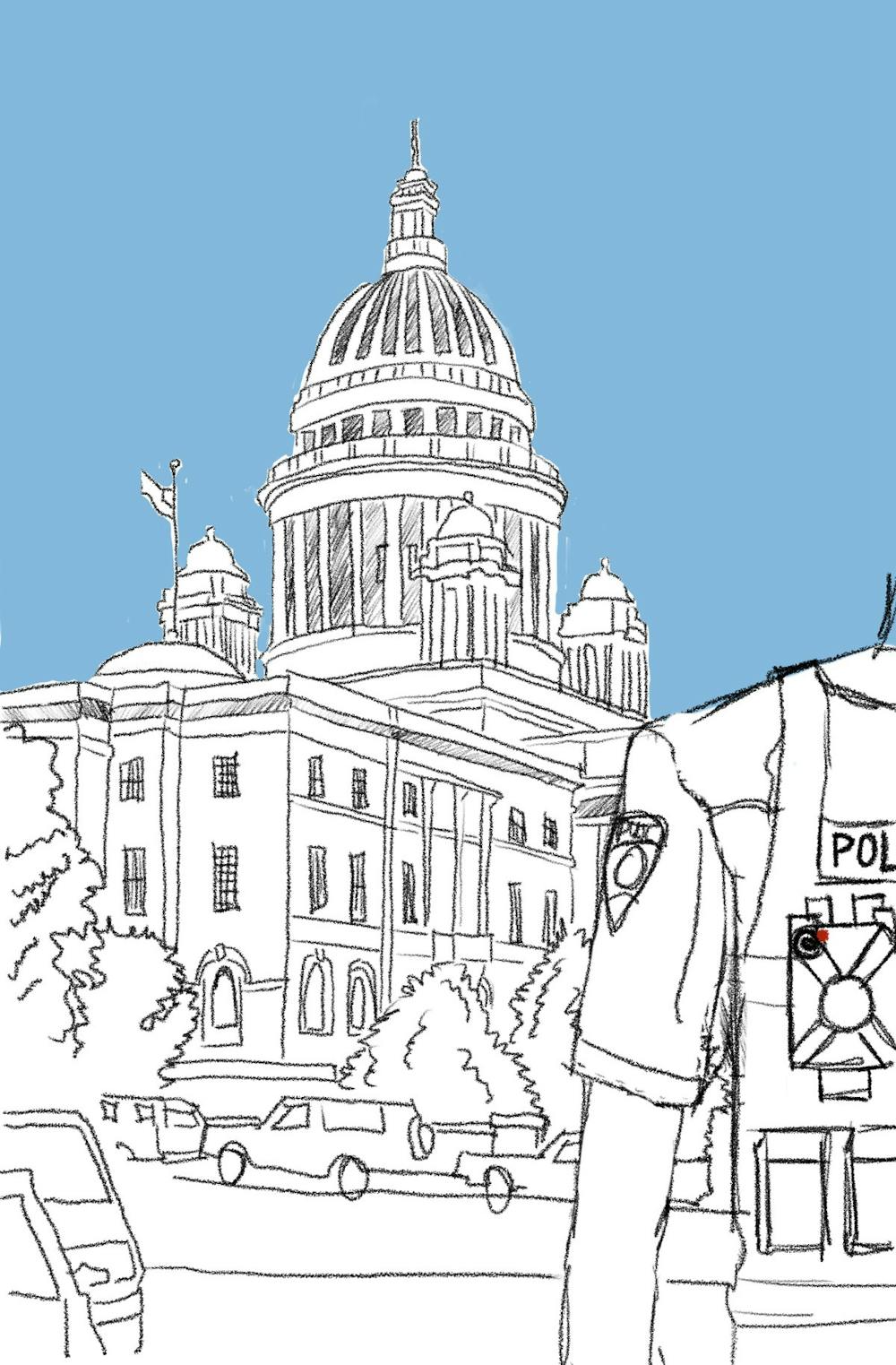Recent legislation proposed in the Rhode Island General Assembly would make it easier to access public records including 911 calls, arrest reports and police body camera footage.
The bill, introduced by State Sen. Louis DiPalma MSc’89 P’08 (D-Little Compton) and Rep. Joseph Solomon (D-Warwick), aims to expand the Access to Public Records Act, which facilitates “public access to public records,” according to the bill. Private universities that currently employ police or peace officers — including Brown, Johnson and Wales University and Providence College — would also be subject to requests for police records covered by the bill.
“There is absolutely a public interest in transparency and open government because our public deserves the right to know where and how their taxpayer money is being spent,” said Solomon.
Solomon cited the increasing role of technology in the public sphere — including R.I. law enforcement’s implementation of body-worn cameras in 2021 — as one of the primary motives for updating APRA. The bill was last updated in 2012.
“It’s been over a decade since the General Assembly took a really close look at (APRA) and made any meaningful changes to it,” said Steven Brown, executive director of the American Civil Liberties Union of Rhode Island. “The time has certainly arrived for this most recent review.”
In a Feb. 22 press release, DiPalma said that the proposed legislation comes in response to growing concerns over police accountability.
The proposed bill, introduced Feb. 16, would expand and clarify public access to a number of police records. Any body-worn camera footage containing “police use of force” would be made public within 30 days of the incident, unless the incident is actively under investigation.
The bill also makes public all initial narrative arrest reports, which the bill defines as any written report from an arresting or investigating officer detailing the circumstances of an arrest.
While reports of internal investigations into police misconduct have always been legally considered public information, Steven Brown said that the proposed legislation would clarify the public’s right to access these reports. Personal information about the officers under investigation, though, may not be disclosed if doing so would be an “unwarranted invasion of personal privacy,” according to the bill.
Expanding APRA, Solomon said, would also make it cheaper for citizens to access government information. For all public records requests, the bill would decrease the maximum cost of copying records from 15 to 5 cents per page. The bill also requires the approval of any cost waiver or reduction requests in the public interest. Currently, the law states that a court may choose to reduce or waive fees for a request in public interest.
According to Solomon, the maximum fine for a willful violation of the laws surrounding a valid public records request would also increase to $10,000 from $2,000.
Proponents of the bill, including ACLU Rhode Island and Black Lives Matter Rhode Island Political Action Committee, argue that expanding access to public records is key to government transparency.
“We think it should be a fundamental component of any public official’s duties to provide information to the public,” Steven Brown said.
“This bill really addresses a gap when it comes to not only reporting, but also restoring public faith in what’s actually going on,” said Harrison Tuttle, president of BLM RI PAC.
Both Steven Brown and Tuttle highlighted the bill’s potential impact on police accountability. Police “have tremendous power in enforcing the law,” Steven Brown said. “It’s really crucial to ensure oversight of such an awesome power.”
According to Solomon, the proposed bill would not affect Rhode Island’s Law Enforcement Officers’ Bill of Rights, which determines what information can be disclosed to the public in the event of officer misconduct. Since the murder of George Floyd in 2020, organizations including BLM RI PAC have pushed for the reform or repeal of LEOBoR, The Herald previously reported.
While LEOBoR would “still be a hurdle to getting information,” if the new bill passes, Tuttle believes that the new legislation “opens the door” to increased transparency.
But not all organizations are supportive of the bill as written.
Sidney Wordell, executive director of the Rhode Island Police Chiefs’ Association, said that the organization plans to oppose numerous sections of the bill in committee hearings.
Access to public records, Wordell said, is a “balancing act” between the right to privacy and the right to transparency. While RIPCA supports “the idea of releasing information and transparency,” Wordell said that “the bill goes a little too far in some areas.”
These areas, Wordell added, include granting expanded access to arrest reports and internal investigations and decreasing costs for retrieval. Providing access to initial narrative reports of arrest and internal investigations “takes the presumed innocence out of the equation,” Wordell said.
In the event that an internal investigation is non-criminal and the officer is not fired, Wordell said he believes that the investigation “should stay within the four walls” of the department as “discipline is not meant to shame an individual.”
In particular, Wordell said he is opposed to the section declaring that public bodies — including the police department — can no longer charge for any time spent redacting private or irrelevant information from the requested records.
Wordell hopes that the committee hearing process will be an opportunity to “find a happy medium” between privacy and transparency.
Solomon anticipates that the decision to pass, amend or reject the bill will be made sometime before the legislative session ends June 30.
The bill “was a product of positive discussions,” Solomon said. “The committee process always provides us with an opportunity to make a great bill even better.”
Julianna Chang was the managing editor of production and development of The Herald's 135th Editorial Board. She previously served as a university news editor overseeing the academics & advising and student government beats. A junior from the Bay Area, Julianna is studying Biology and Political Science on the pre-medical track. When she's not in class or in the office, she can be found eating some type of noodle soup and devouring bad books.





